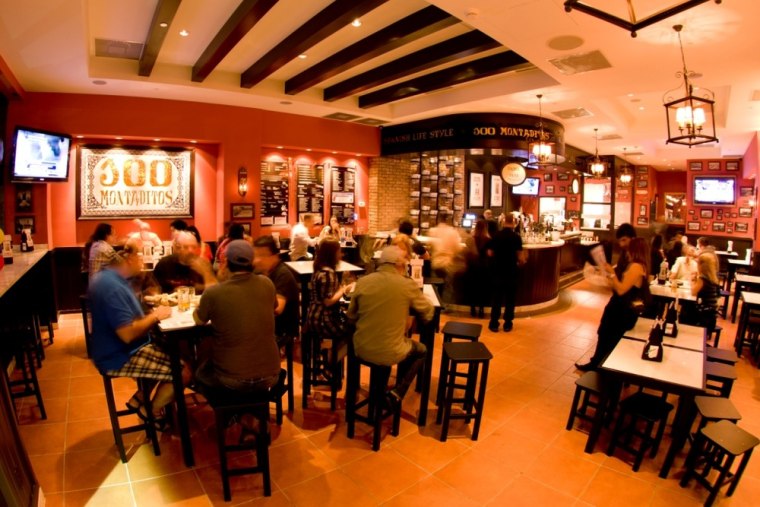With Spain mired in its worst financial crisis in almost six decades and concern about a government default swirling, you’d think there’d be little reason to party. But on a recent sweltering evening in Madrid, Juan Caldera was busy socializing at a local restaurant as he munched on a bacon and brie sandwich washed down with a cold beer. Thankfully for the 23-year-old law student, a big night out comes at a small cost at trendy 100 Montaditos, a restaurant chain that’s taken Spain by storm. The traditional 5-inch sandwiches that give the chain its name some nights cost just €1 ($1.42), while beer is €2, the perfect tab for a nation coping with a 21 percent jobless rate, the highest in Europe. “We love the price and the atmosphere,” says Caldera. “I come with friends once a week and have three to seven montaditos. There are so many people, you even have to line up for a few minutes to grab a chair.”
The chain has doubled its number of restaurants across Spain since 2007, to 200, and now it’s setting its sights on the U.S. Restalia Grupo de Eurorestauración, the parent company of 100 Montaditos, aims to open 4,000 American stores in the next five years. As it does in Europe, the chain will chase that goal with a combination of company-owned stores and franchised restaurants. It would be a faster expansion than that of Starbucks, which didn’t have that many outlets in the U.S. until three decades after its first shop opened.
The Madrid-based chain in January opened its first U.S. restaurant in Miami and aims to have eight outlets in Florida by next March. (The Miami store is already raking in $140,000 a month, compared with the $213,000 a month that a mature outlet in Spain generates.) The next stop will be New York’s Union Square, wherethe Iberian chain plans to lure students living in the neighborhood with the promise of Mediterranean fare such as montaditos stuffed with serrano ham or duck mousse with crispy onion. “We see exponential growth in the states and worldwide,” says General Director Carlos Pérez, a former radio journalist. “We see Americans coming to our restaurant there, and they relax and enjoy the atmosphere as if they were in Spain.”
Businessweek: Tea is hot, from trendy teahouses to Starbucks
Despite the fast start at home, analysts say the Spanish company’s plans are too ambitious. “There’s nothing wrong with dreaming big, but it’s massively difficult (to) achieve that growth pace,” says Larry Miller, a managing director at RBC Capital Markets in Atlanta. “Nobody here has ever done it, and it may be even more difficult for a foreign company.”
Founded in 2000 by Chairman José Maria Fernández Capitán, 100 Montaditos has expanded across Spain’s major cities with shops styled to look like traditional Spanish restaurants where one wouldn’t be surprised to find ahock of ham hanging from the ceiling. Beer is poured from perspiring taps, and on Wednesdays almost everything goes for €1. In the U.S. sandwiches are sold for $1 to $2.50, and on Fridays patrons get two buckets of beer, or 10 bottles, for the price of one.
100 Montaditos relies on word of mouth and social-networking sites including Facebook and Twitter. It keeps prices low thanks to high-volume contracts and long-term agreements with food and drink providers suchas PepsiCo and Spanish beer company Grupo Mahou San Miguel, says Deputy General Director Javier Resa.
Businessweek: McDonald’s no match for KFC in China as Colonel rules fast food
The eight-month-old restaurant operated by franchisee Ernesto Moral in a landmark area of downtown Madrid holds 170 people in the dining room and another 180 on an outside terrace. Diners inside, served by waiters, typically eat in 15 to 20 minutes; guests linger longer on the terrace. The average check is about €6. “My own experience has so far been positive,” says Moral. “I’ve beaten my forecasts for both revenues and profit.”
Parent company Restalia, which aims to reach 500 restaurants in Spain by 2014, is looking at other European markets, including the U.K. and Italy, and already has one restaurant in both France and Portugal. Later this year, 100 Montaditos will open three restaurants in Mexico and twoin Colombia.
The biggest growth prospects are in the U.S., where the chain plans to use franchising to fuel its American expansion. It won’t need to raise any new capital for the parent company, says Resa, who concedes that the U.S. growth goal is “ambitious.” Restalia has also studied a potential public listing on a U.S. stock exchange once it’s established a presence.
Analysts say that could take longer than the company would like. Starbucks, the world’s largest coffee-shop operator, shut down unprofitable stores in 2008 and 2009 after opening more than 800 stores a year in the U.S. for six years in a row. It opened as many as 1,788 stores in its fastest year of expansion, fiscal 2007. At its height in 2008, Starbucks had 11,570 outlets in the U.S. It now has 10,957.
Businessweek: The 25 fattiest fast foods
“Although there are risks of over-expansion, the U.S. can definitely be a market full of opportunities for 100 Montaditos,” says Victor Conde, a professor of marketing at Universidad Nebrija in Madrid and a former adviser to fast-food chain Burger King Holdings. “In great economic crisis like this, you find the biggest opportunities if you do things well.”
The bottom line: Spain’s 100 Montaditos restaurant chain is growing at a 50 percent rate, despite the local financial crisis.
